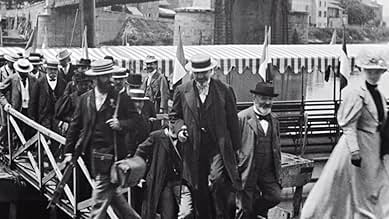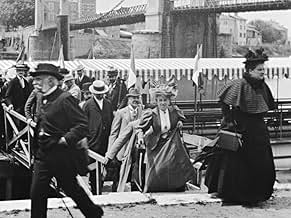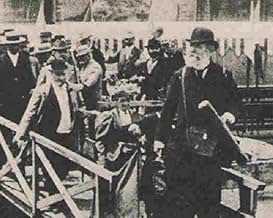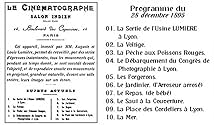IMDb रेटिंग
5.7/10
2.1 हज़ार
आपकी रेटिंग
अपनी भाषा में प्लॉट जोड़ेंThe photographers who need to participate in the congress of Lyon get off a boat in Neuville-sur-Saône, dividing to the right and left.The photographers who need to participate in the congress of Lyon get off a boat in Neuville-sur-Saône, dividing to the right and left.The photographers who need to participate in the congress of Lyon get off a boat in Neuville-sur-Saône, dividing to the right and left.
- निर्देशक
- स्टार
P.J.C. Janssen
- Self
- (बिना क्रेडिट के)
फ़ीचर्ड समीक्षाएं
Considering that the Photographical Congress arriving in Lyon was a major event, I suppose you could call this one more important than the Lumiere Brothers' previous efforts because the event is something that most people wouldn't see a lot of the time. This film captures simply what the title suggests: a whole crowd of photographers coming off a ferry. Indeed quite a few of the photographers notice the camera and while some tip their hats in greeting, others notice the camera and refuse to be part of the film by dashing off the screen quickly.
At only a minute watching, this short documentary isn't a waste of time. It will probably only be interesting to people like me who, believe it or not, somehow find entertainment in watching these things. Audiences nowadays will find it pretty uninteresting--except for if you're a historian. In that case it's a must-see.
At only a minute watching, this short documentary isn't a waste of time. It will probably only be interesting to people like me who, believe it or not, somehow find entertainment in watching these things. Audiences nowadays will find it pretty uninteresting--except for if you're a historian. In that case it's a must-see.
Neuville-sur-Saône: Débarquement du congrès des photographes à Lyon (1895)
The title of this Lumiere Brothers film pretty much tells you what you're looking at. We see a group of people walking off a riverboat and coming close to the camera who catches their every move. There's certainly nothing ground-breaking about this early "actuality" movie but if you're a fan of these then you're bound to enjoy this one. I always enjoy watching these because it gives you a great chance to see how things were so many years ago. This one here features a lot of people so you get a terrific idea of the type of clothing that was worn during this period as well as a chance to see the various other things going on. This here is well worth watching if you enjoy these movies.
The title of this Lumiere Brothers film pretty much tells you what you're looking at. We see a group of people walking off a riverboat and coming close to the camera who catches their every move. There's certainly nothing ground-breaking about this early "actuality" movie but if you're a fan of these then you're bound to enjoy this one. I always enjoy watching these because it gives you a great chance to see how things were so many years ago. This one here features a lot of people so you get a terrific idea of the type of clothing that was worn during this period as well as a chance to see the various other things going on. This here is well worth watching if you enjoy these movies.
Louis Lumiere was a businessman. Since he was in the photographic business (his families factory in Lyon, France produced what many considered to be the best treated glass plates used in photography at that time - the mid 1890s), he was also a photographer. But, I am sure, he considered himself first-and-foremost a scientist. He considered his new invention, the Cinematopgraph, to be a scientific instrument. That is why during 1894 and 1895, he spent quite a bit of effort to gain approbation from various scientific groups. He wanted to keep the photographic community, in which he was well known, appraised of his endeavors. One method of doing this was to attend, in June 1895, a congress of photographers that was gathering at Neuville-Sur-Soane - a town just a short distance north of Lyon.
Louis positioned his camera at the base of a gangplank down which delegates to the conference descended from a Soane river ferry. Certainly, all of the descending men and women knew, by that time, of Louis' invention - although it had not yet been made public. Later that evening the Lumiere brothers showed the congress attendees eight of their less-than-one-minute films. And in one of these films the members saw themselves descending from the boat.
Louis positioned his camera at the base of a gangplank down which delegates to the conference descended from a Soane river ferry. Certainly, all of the descending men and women knew, by that time, of Louis' invention - although it had not yet been made public. Later that evening the Lumiere brothers showed the congress attendees eight of their less-than-one-minute films. And in one of these films the members saw themselves descending from the boat.
This film is a virtual remake of 'Sortie d'Usine', perhaps making it the first self-referential movie. Instead of the workers streaming out of the factory, we have fellow cinematograph specialists disembarking a liner for a congress. Instead of workers silently doing their masters' bidding, we have colleagues, friends, peers, fearlessly greeting the camera as equals.
This is a film about film - the Congressionists walk with their cameras; this film was precessed immediately for viewing at the conference. Already, the Lumieres' desire to 'objectively' record the world has turned into a naval-gazing admission of defeat, of the impossibility of objectivity untainted by subjectivity or ideology. Godard once suggested that the most honest film would be of a camera recording itself in a mirror. This film is an early grasping of what he means.
This is a film about film - the Congressionists walk with their cameras; this film was precessed immediately for viewing at the conference. Already, the Lumieres' desire to 'objectively' record the world has turned into a naval-gazing admission of defeat, of the impossibility of objectivity untainted by subjectivity or ideology. Godard once suggested that the most honest film would be of a camera recording itself in a mirror. This film is an early grasping of what he means.
I watched this film on a DVD that was rammed with short films from the period. I didn't watch all of them as the main problem with these type of things that their value is more in their historical novelty value rather than entertainment. So to watch them you do need to be put in the correct context so that you can keep this in mind and not watch it with modern eyes. With the Primitives & Pioneers DVD collection though you get nothing to help you out, literally the films are played one after the other (the main menu option is "play all") for several hours. With this it is hard to understand their relevance and as an educational tool it falls down as it leaves the viewer to fend for themselves, which I'm sure is fine for some viewers but certainly not the majority. What it means is that the DVD saves you searching the web for the films individually by putting them all in one place but that's about it.
Anyway onto this film which is as the title suggests, lots of people getting off a boat. This is essentially a rerun of the Lumière film that saw lots of people leaving a factory and it is as exciting. The only thing that did make it interesting to me was the people in question react differently from those leaving the works in the other film. Maybe it is to do with their class, or maybe they are more savvy about cameras or maybe they are just told to do this but some wave, smile etc a reaction you would get today but interesting to see it then when such a thing was very much a novelty.
Other than this point of interest though, I found the film to be what it now is a historical novelty that can only be seen as such.
Anyway onto this film which is as the title suggests, lots of people getting off a boat. This is essentially a rerun of the Lumière film that saw lots of people leaving a factory and it is as exciting. The only thing that did make it interesting to me was the people in question react differently from those leaving the works in the other film. Maybe it is to do with their class, or maybe they are more savvy about cameras or maybe they are just told to do this but some wave, smile etc a reaction you would get today but interesting to see it then when such a thing was very much a novelty.
Other than this point of interest though, I found the film to be what it now is a historical novelty that can only be seen as such.
क्या आपको पता है
- कनेक्शनEdited into The Lumière Brothers' First Films (1996)
टॉप पसंद
रेटिंग देने के लिए साइन-इन करें और वैयक्तिकृत सुझावों के लिए वॉचलिस्ट करें
विवरण
- रिलीज़ की तारीख़
- कंट्री ऑफ़ ओरिजिन
- भाषा
- इस रूप में भी जाना जाता है
- The Photographical Congress Arrives in Lyon
- फ़िल्माने की जगहें
- उत्पादन कंपनी
- IMDbPro पर और कंपनी क्रेडिट देखें
- चलने की अवधि
- 1 मि
- रंग
- ध्वनि मिश्रण
- पक्ष अनुपात
- 1.33 : 1
इस पेज में योगदान दें
किसी बदलाव का सुझाव दें या अनुपलब्ध कॉन्टेंट जोड़ें





















